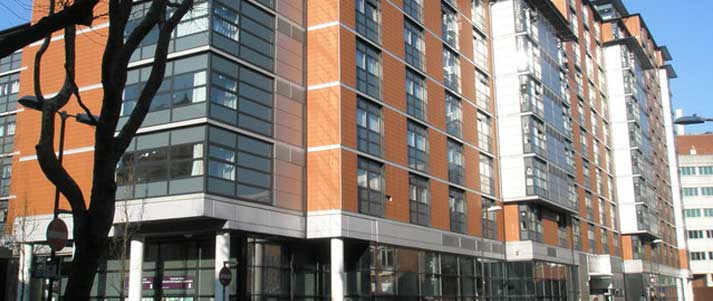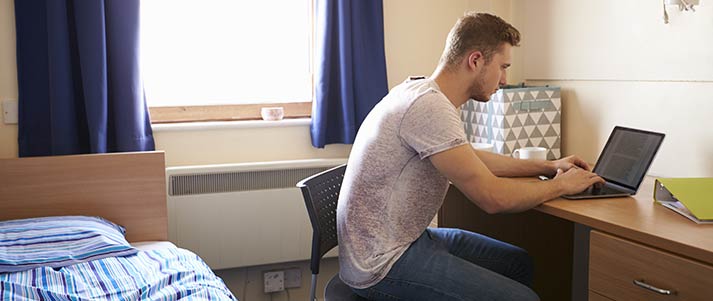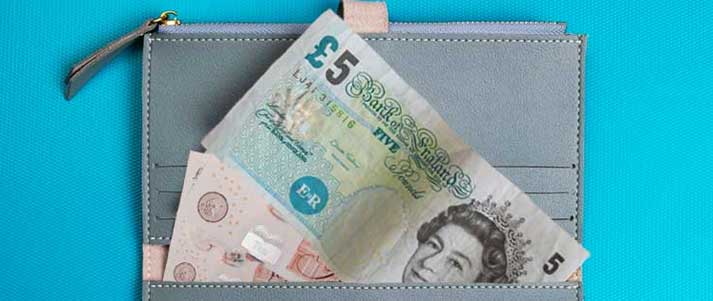How coronavirus impacts students
The pandemic has affected students at every level. Will lectures still be taught in person at university? Will coronavirus affect Student Finance? Will you still have to pay rent at uni?

Credit: [email protected] – Shutterstock
It seems like only yesterday that the thought of self-isolating was a dystopian fantasy.
Most coronavirus rules have ended in the UK, but there's still some confusion around how coronavirus affects university life right now.
This guide will help you navigate renting, Student Finance and offer some tips if you're struggling financially to cover basic needs.
What's in this guide?
Coronavirus and student accommodation
Whether you're living in university halls or private accommodation, you'll no doubt be wondering how coronavirus impacts your living situation at uni.
Our National Student Accommodation Survey 2021 revealed that students had, on average, received £75pw in rent discounts at the time of the survey in the 2020/21 academic year. However, a significantly higher proportion of students received discounts in uni accommodation (63%) compared to those with private landlords (6%).
Worryingly, based on the results from our survey, we estimated that nearly £1 billion had been wasted by students on unusable accommodation due to the pandemic.
Students in university halls of residence

Credit: Basher Eyrer - Geograph
In 2020/21, there was a huge amount of media coverage about students in university accommodation.
Students across the country found themselves in pretty tough circumstances. Many needed to start self-isolating soon after moving into halls, while others weren't able to get back after Christmas.
If you find yourself in a situation like this, here are the key things to know.
Can you get rent refunds for university accommodation?
If you're living in a hall of residence, whether or not you can receive a rent rebate or a break from paying rent will be down to your university.
As we mentioned earlier, in the latest National Student Accommodation Survey, just over three in five students in university halls said they have been offered a rent discount.
If your university doesn't offer you a refund but you think you should be entitled to one, it could be worth reaching out to a representative of your halls of residence.
You can present a case to them on why you think you deserve compensation and, if they're not able to help, they may be able to direct you to someone who can.
Make sure you know your rights as a tenant. And, to strengthen your case, collect as much evidence as you can to show why you think you haven't received your money's worth.
Student rent strikes
In 2020/21, students across the country made it clear that they were unwilling to keep paying full rent for their room for all of this academic year, without getting a refund.
In protest, there were widespread rent strikes – with many students receiving refunds following their actions.
We heard of 20+ rent strikes that either happened or were in the process of being planned, at institutions including the University of Manchester, University of Cambridge and University of Bristol.
As an example of a rent strike that led to refunds, students in halls at the University of Manchester were given a 30% cut in rent from September 2020 to 31st January 2021.
What happens if you move out of university halls early?

Credit: Monkey Business Images – Shutterstock
Although universities aren't obliged to waive or refund your rent if you need to leave halls early, some may decide to.
Compared to those living in private accommodation, you may have more chance of getting a reduction in rent or early termination of the contract – but there's no guarantee.
In September 2020, we heard from Citizens Advice. A senior housing expert from the charity, Amy Hughes, said:
It's always worth getting in touch with your landlord and trying to negotiate. But realistically, if there is no obligation for them to release you from the contract, they may well be unwilling to do so.
Where the landlord is the university, they may be more sympathetic to a short-term reduction in rent, or ending a contract early, if there is no longer any reason for you to remain in halls.
However, it is early in the academic year, and it may be difficult to find alternative halls of residence accommodation if a student gives up their place, but later wishes to return.
Students in private accommodation

Credit: John Seb Barber - Flickr
Although it can be tricky for students in university halls, it can be harder still to get refunds or terminate contracts early when you're renting privately.
Privately rented accommodation can include student houses, flats and private halls (i.e. ones owned by a company rather than your university).
Can you get rent refunds for private accommodation?
In January 2021, a couple of private student accommodation providers (Unite and Student Roost) announced that they would be offering rent refunds to students who weren't able to return for the Spring term due to restrictions.
However, please note: you needed to apply to receive the rent reductions by a certain date, and the deadlines have now passed.
If you're not a resident in Unite or Student Roost accommodation, it's important to bear in mind that some landlords may be generous and offer you a rent reduction, but this is very unlikely. You are contractually bound to continue covering the rent of your accommodation for however long is stated in your tenancy agreement.
But, you may be able to terminate the contract early if you have a break clause in the agreement.
For example, if you signed up for a one-year let but you have a six-month break clause, this means that you should be able to end the contract after six months – you'll just need to pay rent for the notice period, then you should be fine to move out and stop paying rent.
Can you get a refund on your tuition fees?

One question that a lot of students will be wondering is: could you get compensation from your university due to the coronavirus pandemic?
It is a possibility that you could be entitled to compensation, but we would stress that it's by no means guaranteed.
For starters, it was unfortunately confirmed by the government in May 2020 that, even if universities offer teaching online, students would still be expected to pay full tuition fees – on the condition that the online teaching is up to scratch.
And, in October 2020, the Universities Minister, Michelle Donelan, built on this to say:
It would be unacceptable for a student to be paying those tuition fees and not getting that quality or not getting that support.
If you think that the support or quality of education at your uni hasn't been up to scratch, this is one line of argument you could make if you do wish to make a claim for compensation.
Overall, it's important to think carefully about what you were offered when you applied for your course, and whether you think you have received an adequate uni experience.
How to claim compensation from your university due to coronavirus

Credit: Atanas Bezov - Shutterstock
Are you confident you haven't received your money's worth at uni? The first steps are to outline exactly why you feel this way, collecting as much evidence as you can to build up a case. Then, approach your university with your complaint.
If you are unhappy with the university's response, you would then have the option to take your complaint further to an ombudsman if you wish.
These are the ombudsman services that you can approach with your complaint, depending on whereabouts in the UK you're based:
- Office of the Independent Adjudicator for Higher Education (OIA) – For students in England and Wales
- Scottish Public Services Ombudsman (SPSO) – For students in Scotland
- Northern Ireland Public Services Ombudsman (NIPSO) – For students in Northern Ireland.
The ombudsman will consider your complaint, and if they think it's justified, they'll make a suggestion to your university on how they should respond. For example, if they think you should be compensated, they will say this to your uni and give a suggested amount.
For more info and advice about claiming compensation from your university, check out our in-depth guide which explains the process, step-by-step.
How coronavirus affects Student Finance

Good news: in terms of your Student Loan, it's basically business as usual.
You should be receiving the scheduled payments of your Maintenance Loan, regardless of whether or not your university has made alternative arrangements for teaching.
You could receive a higher Student Loan if your household income has gone down
If your household has experienced a loss of income due to COVID-19, you may be entitled to receive a higher Maintenance Loan. This is because, if your household income drops by a certain amount (more on this shortly), you could complete a Current Year Income Assessment.
Usually, when you apply for Student Finance, wherever in the UK you are, you're asked to provide information about your or your parents' income from the previous tax year to work out how much Maintenance Loan you're entitled to.
Because of this, the amount of Maintenance Loan you'd get would be calculated based on how much your parents earned (or how much you earned if you're financially independent) two years ago.
If your household income is lower now than it was then, you may be able to provide details of your income for the current tax year instead of last year's. You must then keep your income details up to date during the year and confirm your actual income at the end of the tax year.
Here's a rundown of the minimum income drops required to qualify for a Current Year Income Assessment in each part of the UK:
- Student Finance England – 15% drop in household income
- Student Finance Northern Ireland – 5% drop in household income
- SAAS (Scottish Student Finance) – A drop in household income to a lower income bracket
- Student Finance Wales – 15% drop in household income.
What happens to Student Finance when you drop out of uni?
If you're thinking about dropping out of university due to the challenges posed by coronavirus, it's important not to rush into this decision. Contact your tutor and student support services at uni to discuss your options, and see if there's anything more they can do to support you.
Then, if you still decide that it would be the right decision for you to withdraw from your degree, make sure you're familiar with how this impacts your Student Loan. In particular, it's important to know that there will be money that you'll need to repay if you've had a Tuition Fee Loan and/or a Maintenance Loan.
Firstly, you may need to pay back a portion of your Maintenance Loan immediately if you drop out midway through a term. For example, if you drop out exactly halfway through the semester, you might be asked to start paying back half of your most recent loan instalment straight away.
If this is the case, you should be able to chat with the Student Loans Company (SLC) to discuss an affordable repayment plan.
For the rest of your Student Loan, you won't need to start paying it back until the April after you withdraw from your course, and only then when you're earning above the repayment threshold.
We talk you through all of this in our guide on what happens to your Student Loan if you drop out of university.
University hardship fund
If you're struggling for money for any reason, get in touch with the student support services at university. They may be able to offer you hardship funds to help you get by.
The support services will assess the hardship payments at their discretion and may give priority to some students based on their needs.
And if coronavirus has taken a toll on your mental health, we'd also encourage you to approach your university's support services – they may have special measures in place to help you manage the challenges posed by the pandemic.
Do you have to repay your Student Loan if you lost a job because of coronavirus?
You only start repaying your Student Loan from April in the year after you leave uni, and even then it's only when earning over the repayment threshold.
So, if you're a graduate and you've lost some or all of your income due to coronavirus, please try not to worry about your Student Loan repayments – if your income drops below the threshold, the payments will stop until you begin earning more again.
Tips for making and saving money during the pandemic
How to make money during the pandemic

Credit: Yevgen Kravchenko, kamui29, Bell Photography 423 – Shutterstock
We always recommend trying to get a Maintenance Loan first but, if your loan doesn't stretch far enough, there are many more ways to find extra money at uni:
- Apply for student grants
- Ask for support from parents, if they're happy and able to give you money at uni (find out how much the government expects your parents to contribute each year)
- Sell unwanted belongings online
- Make sure you've accessed the free money available to you
- Do paid online surveys
- Dip into an interest- and fee-free overdraft
- Start freelancing
- Set up your own business
- Make money from blogging
- Try a quick, easy way to make money.
How to save money during the pandemic

Credit: Watchara Ritjan – Shutterstock
To make your money stretch further during the coronavirus pandemic, try these top tips:
- Follow a meal plan
- See if you're eligible for cheaper healthcare and dentistry
- Use handy money-saving tools
- Try these tips for saving money on textbooks
- Find out if you could get free sanitary products
- Avoid gym fees by doing free workouts
- Try ways to get food and drink for free
- Use supermarket cashback apps
- Keep an eye on our daily deals
- Go through our ultimate guide to saving cash and find the money-management techniques that work for you.
Our student money cheat sheet distils loads of advice from our site onto just two pages.








